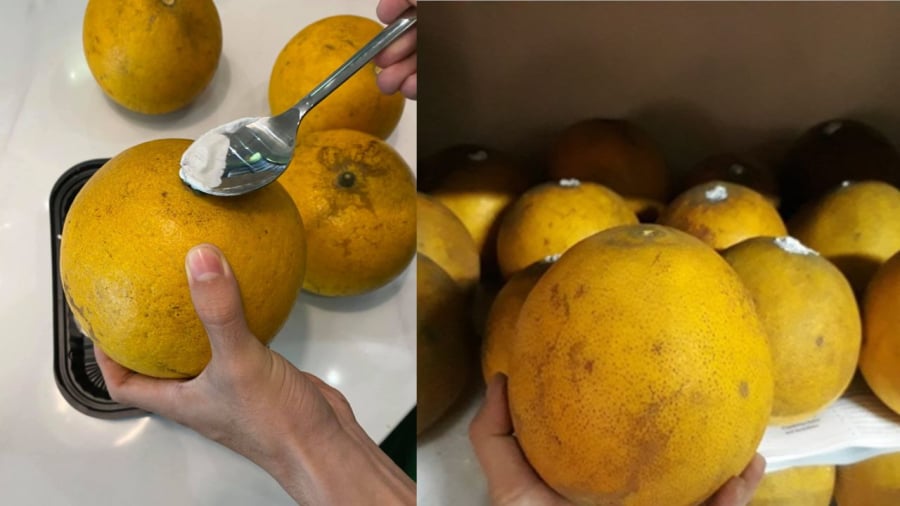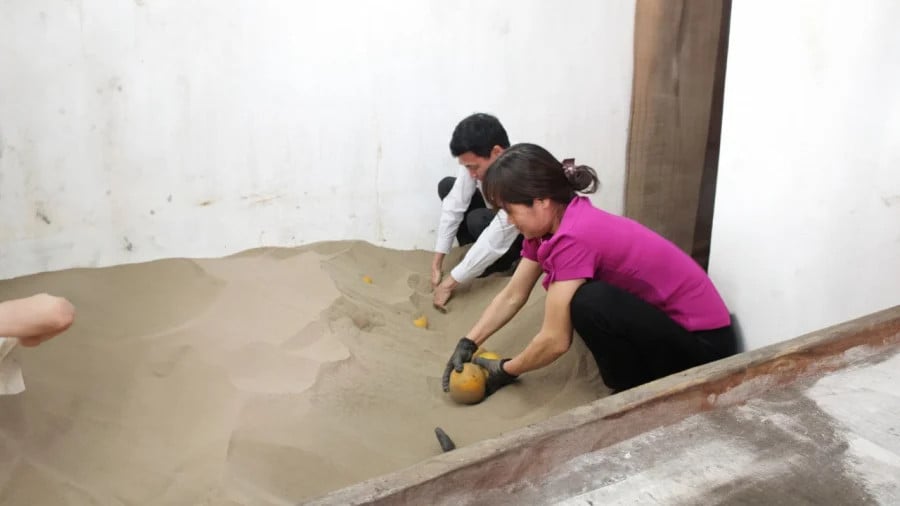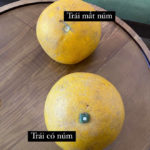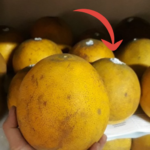Grapefruits are in season, especially certain varieties like Phuc Trach and Doan Hung, which are not available year-round like their green counterparts. Grapefruit is a nutritious fruit with a plethora of health benefits. It is also a popular dessert and a great palate cleanser, especially during the holiday season with its abundance of feasts and celebrations.
To prolong the shelf life of grapefruits, it is important to keep their peels dry and free from moisture. Here are some effective tips to achieve that:
Lime Application
The stem end of a grapefruit is a potential entry point for bacteria, which can cause the fruit to spoil. Applying lime to this area can act as a barrier against bacterial invasion. Lime, due to its high alkalinity, possesses antibacterial properties and helps in eliminating these harmful microorganisms. By focusing on this “gateway,” you can effectively prevent decay. After applying lime, cover the stem with paper or carton before storing the fruit. Avoid stacking multiple layers of grapefruits on top of each other, and store them in a dry and well-ventilated area.

Lime Application to Prevent Bacterial Infection
Burial in Dry Sand
Dry sand is another effective method for preserving grapefruits and other fruits. Ensure that the outer skin of the grapefruit is completely dry before burying it in a pile of dry sand or placing it in a dry, clean carton or plastic box filled with sand. Arrange larger, heavier grapefruits at the bottom and smaller ones on top. Sand absorbs moisture and helps maintain the flavor of the fruit while preventing mold and decay. This method can keep grapefruits fresh for several months.

Burial in Dry Sand for Effective Preservation
Arrangement on a Wooden Trellis for Ventilation
Grapefruits are susceptible to spoilage when their peels are damp and compressed. Placing them on a wooden trellis in a well-ventilated area helps reduce contact with mold and ensures proper airflow. Push the trellis into a cool, dry area, and cover it with paper or carton before arranging the fruit. This method promotes dryness and inhibits mold growth. Combining this technique with lime application can be even more effective. Using newspaper will further enhance ventilation and mold prevention.
Storage in a Dry, Ventilated Area Under the Bed
The underside of a bed is typically a dry and dimly lit space with minimal bacterial activity. Storing grapefruits in such an area can prolong their freshness. However, regular inspections are necessary to identify and remove any spoiled fruit to prevent the spread of decay to the rest of the batch.
Important Considerations for Grapefruit Storage
Grapefruits that have been allowed to ripen on the tree tend to taste better than those freshly plucked. Proper storage not only extends their shelf life but also enhances their flavor. During storage, regularly examine the fruit to identify any spoiled specimens and remove them immediately to prevent mold from spreading to the rest of the batch.
Additionally, avoid moisture accumulation on the fruit’s surface. Before storing grapefruits, ensure they are completely dry, and if necessary, use a towel to absorb any excess moisture. Refrain from washing the fruit prior to storage, as leaving them unwashed and with their natural coating of bloom will help extend their shelf life.
The Ultimate Guide to 10 Easy Halloween Makeup Looks for Her
Halloween is a celebration steeped in Western tradition, offering an exciting opportunity for creative self-expression through elaborate costumes and distinctive makeup looks. This year, elevate your Halloween experience with these ten effortless yet strikingly unique makeup ideas, guaranteed to captivate and inspire.
Delicious Pomelo: The Perfect Fruit for Hot or Humid Weather.
Pomelos are known for their sweet and fragrant taste, making them a popular choice for offering and consumption during Lunar New Year. However, due to the humid weather during spring, pomelos tend to spoil quickly. With this method, pomelos can be preserved for up to 2-3 months without any spoilage.





































